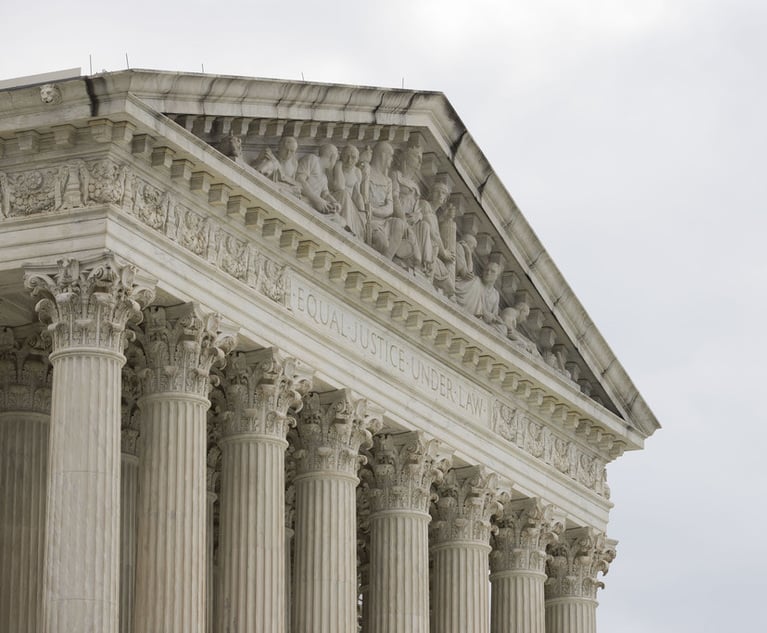 James O'Keefe, of Project Veritas, left, and The New York Times office entrance in New York. Photos: Jae S. Lee/The Dallas Morning News via AP, and Raychel Lean/ALM
James O'Keefe, of Project Veritas, left, and The New York Times office entrance in New York. Photos: Jae S. Lee/The Dallas Morning News via AP, and Raychel Lean/ALM Making a Shambles of the First Amendment
Did Judge Wood carefully analyze legal issues correctly? Was his reasoning coherent, logical, and based on a correct application of law? Did he cite legal authority carefully and responsibly?
January 06, 2022 at 10:00 AM
8 minute read
The decision by a Westchester judge barring The New York Times from publishing information about a notorious right-wing organization, Project Veritas, and ordering The Times to destroy information it already had published, has been described as "dangerous," "outrageous," "jaw-dropping," and "unheard of." Judge Charles Wood's issuance of a prior restraint on the press—ironically on the 50th anniversary of the Supreme Court's landmark decision in New York Times Co. v. United States (the Pentagon Papers case), which held unconstitutional any prior restraint on the press except when publication could result in direct, immediate, and irreparable damage to the Nation—is unprecedented. But as far as I can tell, no commentator has fully examined the asserted legal and constitutional basis for his decision. Did Judge Wood carefully analyze legal issues correctly? Was his reasoning coherent, logical, and based on a correct application of law? Did he cite legal authority carefully and responsibly?
This content has been archived. It is available through our partners, LexisNexis® and Bloomberg Law.
To view this content, please continue to their sites.
Not a Lexis Subscriber?
Subscribe Now
Not a Bloomberg Law Subscriber?
Subscribe Now
NOT FOR REPRINT
© 2024 ALM Global, LLC, All Rights Reserved. Request academic re-use from www.copyright.com. All other uses, submit a request to [email protected]. For more information visit Asset & Logo Licensing.
You Might Like
View All
For Safer Traffic Stops, Replace Paper Documents With ‘Contactless’ Tech
4 minute read
Impact of New NYS Workers’ Compensation Work-Related Stress Relief on Discrimination Claims

Justices Will Weigh Constitutionality of Law Allowing Terror Victims to Sue PLO

Are New York City Housing Providers Ready for the Fair Chance for Housing Act?
10 minute readLaw Firms Mentioned
Trending Stories
Who Got The Work
Michael G. Bongiorno, Andrew Scott Dulberg and Elizabeth E. Driscoll from Wilmer Cutler Pickering Hale and Dorr have stepped in to represent Symbotic Inc., an A.I.-enabled technology platform that focuses on increasing supply chain efficiency, and other defendants in a pending shareholder derivative lawsuit. The case, filed Oct. 2 in Massachusetts District Court by the Brown Law Firm on behalf of Stephen Austen, accuses certain officers and directors of misleading investors in regard to Symbotic's potential for margin growth by failing to disclose that the company was not equipped to timely deploy its systems or manage expenses through project delays. The case, assigned to U.S. District Judge Nathaniel M. Gorton, is 1:24-cv-12522, Austen v. Cohen et al.
Who Got The Work
Edmund Polubinski and Marie Killmond of Davis Polk & Wardwell have entered appearances for data platform software development company MongoDB and other defendants in a pending shareholder derivative lawsuit. The action, filed Oct. 7 in New York Southern District Court by the Brown Law Firm, accuses the company's directors and/or officers of falsely expressing confidence in the company’s restructuring of its sales incentive plan and downplaying the severity of decreases in its upfront commitments. The case is 1:24-cv-07594, Roy v. Ittycheria et al.
Who Got The Work
Amy O. Bruchs and Kurt F. Ellison of Michael Best & Friedrich have entered appearances for Epic Systems Corp. in a pending employment discrimination lawsuit. The suit was filed Sept. 7 in Wisconsin Western District Court by Levine Eisberner LLC and Siri & Glimstad on behalf of a project manager who claims that he was wrongfully terminated after applying for a religious exemption to the defendant's COVID-19 vaccine mandate. The case, assigned to U.S. Magistrate Judge Anita Marie Boor, is 3:24-cv-00630, Secker, Nathan v. Epic Systems Corporation.
Who Got The Work
David X. Sullivan, Thomas J. Finn and Gregory A. Hall from McCarter & English have entered appearances for Sunrun Installation Services in a pending civil rights lawsuit. The complaint was filed Sept. 4 in Connecticut District Court by attorney Robert M. Berke on behalf of former employee George Edward Steins, who was arrested and charged with employing an unregistered home improvement salesperson. The complaint alleges that had Sunrun informed the Connecticut Department of Consumer Protection that the plaintiff's employment had ended in 2017 and that he no longer held Sunrun's home improvement contractor license, he would not have been hit with charges, which were dismissed in May 2024. The case, assigned to U.S. District Judge Jeffrey A. Meyer, is 3:24-cv-01423, Steins v. Sunrun, Inc. et al.
Who Got The Work
Greenberg Traurig shareholder Joshua L. Raskin has entered an appearance for boohoo.com UK Ltd. in a pending patent infringement lawsuit. The suit, filed Sept. 3 in Texas Eastern District Court by Rozier Hardt McDonough on behalf of Alto Dynamics, asserts five patents related to an online shopping platform. The case, assigned to U.S. District Judge Rodney Gilstrap, is 2:24-cv-00719, Alto Dynamics, LLC v. boohoo.com UK Limited.
Featured Firms
Law Offices of Gary Martin Hays & Associates, P.C.
(470) 294-1674
Law Offices of Mark E. Salomone
(857) 444-6468
Smith & Hassler
(713) 739-1250






